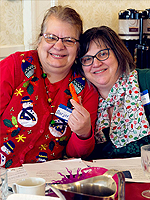
Dear Friends,
When we ring in the New Year 2020, we will begin a year-long celebration of the 50th Anniversary of State Developmental Disabilities Councils.
Our enabling statute – now called “the Developmental Disabilities Assistance and Bill of Right Act” (the DD Act) – claims its origin in legislation first adopted by Congress back in 1970. Referred to as the “Developmental Disabilities Services and Facilities Construction Amendments,” this early law was a long, long way from the vision that the DD Act carries forward today. But it set in place a planning and advisory council in each state with recipients of services making up at least 1/3 of the group.
In the 50 years since that time, virtually all the important laws and court cases protecting the rights of people with disabilities came into being.
Think for a moment of the Individuals with Disabilities Education Act (IDEA, 1990), Olmstead v. LC (1999), and the Americans with Disabilities Act (ADA, also 1990). Congress foresaw that these bills and precedents would only take root if self-advocates and family members worked at the state level to ensure vigorous implementation. Congress looked to the DD Act and its reauthorizations to put those advocates in place.
I was struck recently by how the Vermont DD Council continues to fill that role. The VTDDC has worked for several years to raise State awareness about how conflicts of interest in service delivery may jeopardize the rights of people receiving services. Specifically, we have advocated that the State take seriously a 2014 requirement by the federal Medicaid authority that case management be “free from undue conflict of interest.” In fact, for several years the State contended that the rule simply didn’t apply to Vermont.
Now that a public process has been put in place to address this requirement, the Council continues to bring diverse voices from self-advocates and family members to the table. We continue to ask respectfully for accessible information. We explain how the rule protects the integrity of person-centered planning and individualized supports. I am convinced that the outcome will be better for having had these sometimes-challenging conversations.
Thank you for all the good work that you do.
Wishing you and yours a Happy, Healthy Holiday Season,
Kirsten Murphy, Executive Director
Side notes:
- 2020 Leadership Series participants get into the holiday spirit.
